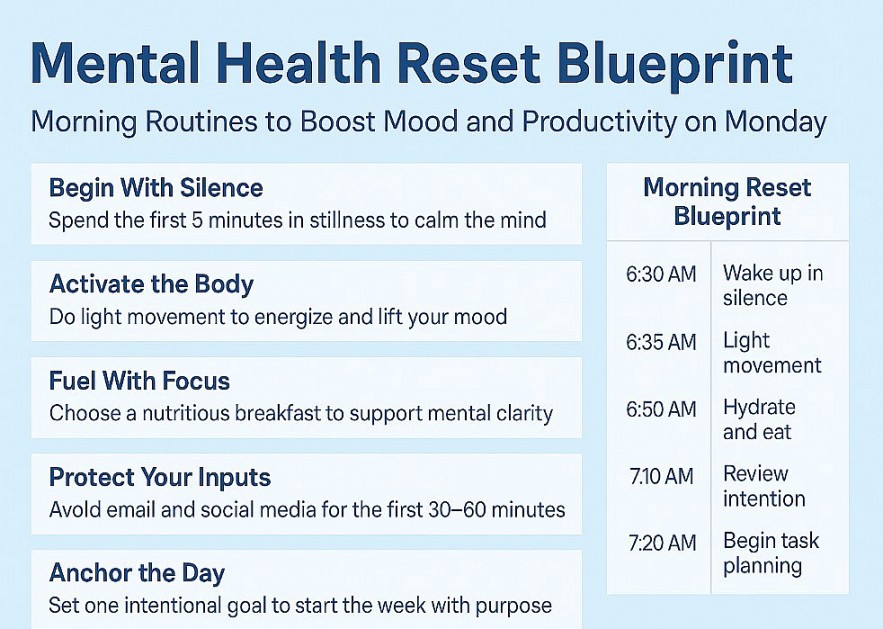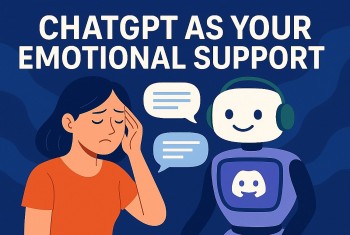Mental Health Reset: Morning Routines That Boost Your Mood and Productivity for the Week Ahead
 |
| Make Monday Morning Your Mental Health Anchor |
The Monday Mental Health Crisis—and Why It Starts Before 9 AM
Monday mornings have long been synonymous with stress, dread, and overwhelm. In fact, workplace studies show that employee stress spikes by 43% on Mondays compared to other weekdays. Why? Because the mind resists re-entry into high-demand environments after rest.
But 2025 offers new tools, research, and insight into an important truth:
Your morning habits—especially on Monday—are the gateway to stronger mental health, productivity, and long-term emotional resilience.
This article provides a science-backed, easy-to-follow guide to mental health reset routines that can be done in under an hour and adapted to any lifestyle, from remote workers and busy parents to college students and high-performing executives.
1. Begin With Silence: Reclaim the First 5 Minutes
In a world of noise, silence is your secret weapon.
Avoid reaching for your phone the moment you wake up. Instead, spend the first 5 minutes in complete stillness. Whether through mindful breathing, quiet reflection, or simply sitting in calm, this ritual lowers stress and shifts your brain from reactive to intentional mode.
Try This Routine:
-
Sit upright in bed or on a cushion.
-
Inhale slowly for 4 counts, hold for 4, exhale for 6.
-
Gently label any thoughts as “thinking” and let them go.
Scientific Backing:
A 2024 Harvard study found that just 5–10 minutes of mindfulness in the morning reduced work-related anxiety by 29% in participants after four weeks.
2. Activate the Body: Light Movement to Prime the Brain
Physical activity isn’t just for fitness—it’s a mood regulation tool. Movement increases dopamine, serotonin, and endorphin levels, which directly improve focus and energy.
Top Morning Movements (10–20 minutes):
-
Sun Salutation yoga flow
-
Walking outdoors (exposure to morning sunlight boosts circadian rhythm)
-
Bodyweight circuit (squats, planks, lunges)
Bonus Tip:
Pair movement with music or a positive podcast to engage both body and mind. Avoid doomscrolling while moving—it cancels out the emotional benefits.
3. Fuel With Focus: Nutrition That Supports Mental Clarity
Breakfast isn’t just about calories—it’s about cognitive fuel. Skip the sugar crash and go for brain-boosting nutrients.
What to Eat:
-
Healthy fats (avocado, nuts, olive oil) for memory and focus
-
Lean protein (eggs, cottage cheese, protein smoothies) for sustained energy
-
Complex carbs (steel-cut oats, multigrain toast) for glucose regulation
-
Hydration (start your day with 16 oz of water)
What to Avoid:
-
High-sugar breakfasts (muffins, pastries, sugary cereals)
-
Caffeine on an empty stomach (can spike anxiety)
Quick Fix:
No time to cook? Blend Greek yogurt, frozen berries, almond butter, oats, and water into a portable smoothie.
4. Protect Your Inputs: Digital Detox Before You Dive In
Your brain is most impressionable during the first 60 minutes of the day. Flooding it with emails, Slack pings, news alerts, and social media trains it to react instead of lead.
Reset Protocol:
-
Do not check email or social media for the first 30–60 minutes.
-
Use that time for analog activities: journaling, stretching, planning, gratitude.
-
If needed, check the calendar—but avoid anything that generates adrenaline.
Why It Works:
A UCLA neuroscience study in 2025 confirmed that digital overstimulation in the first hour of waking negatively impacts focus for up to four hours afterward.
5. Anchor the Day: Define One Intentional Win
Starting the week with too many goals often leads to paralysis. Instead, focus on one meaningful outcome that aligns with your values.
Ask Yourself:
-
What is one task I can complete that will make today feel successful?
-
What emotion do I want to embody this week—calm, courage, clarity?
-
What boundary can I set to protect my focus and mental space?
Write it down—physically. Visual reinforcement increases the likelihood of completion by up to 40%, according to a Cornell behavioral study.
Morning Reset Blueprint: A 45-Minute Routine for Mental Clarity
| Time | Activity |
|---|---|
| 6:30 AM | Wake up in silence; 5-minute breathwork |
| 6:35 AM | Light movement (walk, stretch, or yoga) |
| 6:50 AM | Hydrate and eat a mood-boosting breakfast |
| 7:10 AM | Review daily intention or write in journal |
| 7:20 AM | Begin task planning or transition to work |
Adjust the timing to fit your lifestyle—even a 15-minute condensed version can make a difference when done consistently.
The Neuroscience Behind Morning Mental Health
-
Dopamine peaks in the early hours—making morning an ideal time for goal setting and creativity.
-
Cortisol (stress hormone) naturally spikes at 7–9 AM. A calm routine helps regulate its impact.
-
Neuroplasticity is heightened when routines are consistent, reinforcing emotional resilience.
FAQs: Morning Routines for Mental Health
Q: I don’t have time in the morning. Can I still reset?
A: Absolutely. Even 5–10 minutes of structured stillness, movement, or intention-setting has proven benefits. Consistency matters more than duration.
Q: Is meditation required?
A: Not at all. Walking in silence, journaling, or drinking tea mindfully can all provide similar neurological benefits.
Q: What’s the best way to stick to a routine long-term?
A: Anchor your routine to a non-negotiable habit (like brushing your teeth). Habit-stacking and visual reminders also improve consistency.
Q: Can these routines help with anxiety or burnout?
A: Yes. While not a replacement for therapy, these practices complement professional treatment by building self-regulation and restoring nervous system balance.
Conclusion: Win the Morning, Lead the Week
Your Monday morning sets the tone for the entire week. When you begin with clarity, intention, and care, you build momentum that carries into every meeting, project, and interaction.
Start small. Choose one ritual. Repeat it weekly.
Because in a world of digital chaos, your morning is the last sacred space you still control—and protecting it is a radical act of self-care.
 Improvement of Mental Health with Outdoor Skating Improvement of Mental Health with Outdoor Skating The outdoors are one of the most important things in life. |
 Who Is Longqian Chen? Suspect Identified in Brooklyn Mass Stabbing That Injured Four Girls Who Is Longqian Chen? Suspect Identified in Brooklyn Mass Stabbing That Injured Four Girls A horrifying mass stabbing in Bensonhurst, Brooklyn, on Sunday morning left four young girls hospitalized and a suspect critically injured after being shot by police. |
 FSU Mass Shooting: Unraveling the Tragedy and the Search for Answers FSU Mass Shooting: Unraveling the Tragedy and the Search for Answers Phoenix Ikner, a 20-year-old FSU student and deputy’s son, opened fire on campus, killing two and injuring six. The shooting exposes deep failures in mental ... |
 ChatGPT as Your Emotional Support: Exploring AI in Mental Health ChatGPT as Your Emotional Support: Exploring AI in Mental Health Let’s explore the emerging role of ChatGPT in emotional support—and its promises and boundaries. |
























